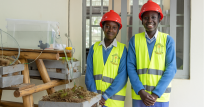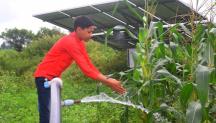

Why Investing in People is Vital for the Energy Transition
Newsletter
Energy transition ambitions are often framed in technological terms such as installed capacity or infrastructure needs. However, just like any other progress, the shift from fossil fuels to renewable energy must be one that places people at the centre, as they drive demand, develop policies, champion innovations, implement actions and eventually benefit from the development.
In 2023, the renewable energy workforce reached 16.2 million people. If the world continues its path to keep 1.5oC within reach, the sector is estimated to create around 30 million jobs by 2030, as well as 77 million jobs in other energy transition-related sectors. Yet, it is not enough to talk about job creation without making sure that we have people with the skills necessary to deliver on the energy transition.
Building the knowledge, skills and competences required for a sustainable energy future will be vital for ensuring that people in different communities-- including youth, women, minorities, underrepresented and disadvantaged groups--across the world are empowered to contribute to and be heard in the process.
Here are more reasons why human resource development should not be overlooked in energy transition efforts:
a. There are untapped talents for the workforce of today and tomorrow
The number of unemployment in many countries and the shift from fossil fuels to renewables offer an opportunity for re-skilling people to contribute to the energy transition. In addition, with 40% of the world’s population currently aged under 25, it is today’s children and youth who will be at the helm of the energy transition in the near and long terms.
Building the talent pipeline and training future energy professionals and workers will be key for not only meeting ambitious energy goals, but also creating pathways to decent works for all.
b. Technologies move fast, and so must people
Since the renewable energy sector is rapidly changing, education and training efforts must also evolve on the same pace to prepare the workforce of tomorrow as well as today in fulfilling their roles.
Early exposure to renewable energy learning and careers plays an important role in harnessing untapped talent, but it requires educators to be empowered and equipped to teach about these topics.
For instance, the growing application of digital solutions and artificial intelligence within the energy sector, will also have ramifications for jobs and skills. There are rising concerns today regarding the impacts of AI and automation on job displacement. With the emergence of new digital energy jobs in roles such as energy data analytics and data science, AI, machine learning, cybersecurity, and software development, many existing roles will also see a transformation of the skill sets required.
Skilling this segment of the workforce will be imperative not only for meeting the evolving needs of industries, but also for ensuring that developing countries are not left behind by the growing digital divide as the energy transition progresses.
c. Increased workers mobility calls for cooperation on standards and qualifications
In an increasingly interconnected world where talents move across the world, the need for occupational standards and comparable qualifications is also becoming increasingly apparent, not only for ensuring that training offerings meet the needs of industry but also for facilitating workforce mobility. More broadly, as countries seek to address labour and skill shortages through labour migration, targeted policies and measures will be necessary to protect the rights of migrant workers while bringing benefits to both countries of origin and host countries.
The growing shift towards accredited qualifications brings with it many benefits, including ensuring consistency and quality across training offerings. At the same time, processes to validate non-formal and informal learning will be necessary to align with the reality that many people within the workforce have gained valuable experience on the job without formal credentials.
Acknowledging the need to close the skills gap between workforce supply and demand, the International Renewable Energy Agency (IRENA) prioritises education and skills within its agenda, with activities broadly falling into two main areas of focus: skilling the energy transition workforce and mainstreaming renewable energy education.
However, accelerating education and training for the energy transition requires collaborations and a more concerted global effort. To leverage the existing collective expertise out there, IRENA invites governments, industries, education, labour, civil society and other local and international entities, to share concrete measures and commitments to accelerate domestic and global skilling for the energy transition.
The Call to Action on Skilling for the Energy Transition aims to drive international cooperation on education and training for a sustainable energy future, focused on the following priority actions:
- the integration of skill development into energy and climate plans and policies
- targeted skilling and upskilling to address current and emerging shortages
- fostering innovative partnerships
- strengthening skill standards and harmonisation of renewable energy qualifications
- integrating renewable energy competences into curricula and building the capacity of educators at all levels.
All submissions will be showcased early next year to build an enhanced awareness of the global skills landscape, as well as encourage further efforts to replicate promising initiatives, inspire more ambitious actions, and promote collaboration across borders.
Join to the Call to Action and be part of the global effort: Call to Action on Skilling for the Energy Transition

Expert Insight by:
Samah Elsayed
Programme Officer, Renewable Energy Education, IRENA
© IRENA 2025
Unless otherwise stated, material in this article may be freely used, shared, copied, reproduced, printed and/or stored, provided that appropriate acknowledgement is given of the author(s) as the source and IRENA as copyright holder.
The findings, interpretations and conclusions expressed herein are those of the author(s) and do not necessarily reflect the opinions of IRENA or all its Members. IRENA does not assume responsibility for the content of this work or guarantee the accuracy of the data included herein. Neither IRENA nor any of its officials, agents, data or other third-party content providers provide a warranty of any kind, either expressed or implied, and they accept no responsibility or liability for any consequence of use of the content or material herein. The mention of specific companies, projects or products does not imply that they are endorsed or recommended, either by IRENA or the author(s). The designations employed and the presentation of material herein do not imply the expression of any opinion on the part of IRENA or the author(s) concerning the legal status of any region, country, territory, city or area or of its authorities, or concerning the delimitation of frontiers or boundaries.




